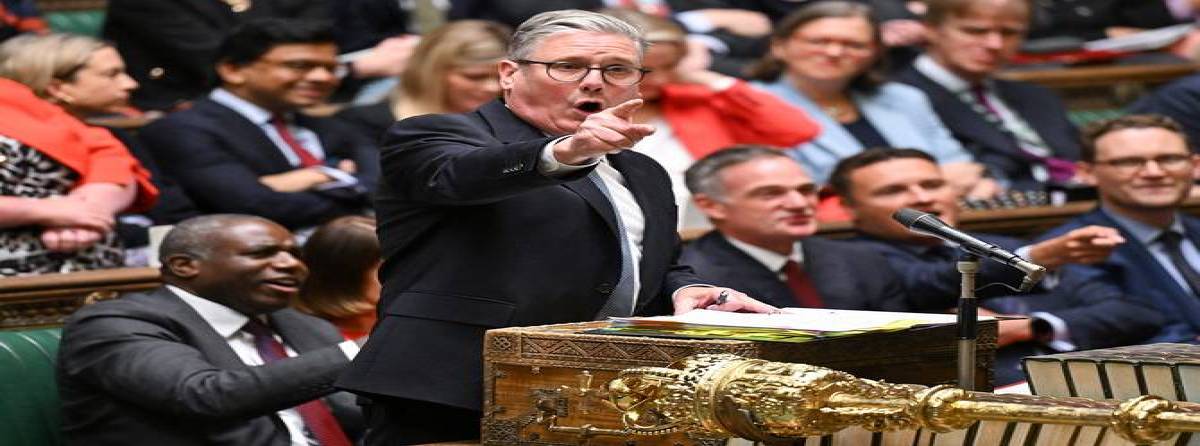1743 Views
UK’s Historic U-Turn: Starmer Cuts Trade, Threatens Sanctions, and Considers Recognizing Palestine!
The longstanding relationship between the United Kingdom and Israel—once characterized by robust political and strategic ties—has entered a phase of unprecedented tension amid the escalating conflict in Gaza. This shift, marked by a transition from staunch support to open criticism, reflects the UK's growing concerns over Israel’s military operations and humanitarian policies. It carries significant implications for diplomatic, economic, and regional stability and could result in a fundamental redefinition of Britain's Middle East foreign policy.
In response to the Gaza conflict, the British government has moved away from its traditional stance of unconditional support for Israel. Prime Minister Keir Starmer and his administration have publicly condemned Israel’s recent military operations as “horrific” and “intolerable,” particularly denouncing the escalation of violence and the severe restrictions on humanitarian aid entering Gaza. This marks a clear departure from earlier expressions of solidarity based on Israel’s security concerns. Foreign Secretary David Lammy has also openly condemned the violence perpetrated by Israeli settlers.
This shift in tone is partly driven by domestic political considerations, including constituencies with significant Muslim populations and widespread public protest against the humanitarian crisis in Gaza. In response to these dynamics, the Labour government has aligned more closely with other Western nations—such as France and Canada—by warning of possible sanctions should Israel continue its military campaign without permitting humanitarian assistance. This diplomatic pressure reflects a broader European trend seeking to curtail Israeli violence and advance a serious resolution to the Gaza crisis.
Even conservative circles, traditionally supportive of Israel, are adopting more cautious stances. This evolution in political sentiment extends beyond the walls of Parliament, indicating growing public awareness in the UK about Israeli human rights violations.
In a decisive move, the UK suspended its Free Trade Agreement negotiations with Israel in March 2025 in direct response to renewed military actions in Gaza and the accompanying restrictions on humanitarian aid. Moreover, London imposed sanctions on Israeli settlers in the West Bank, signaling Britain’s deep disapproval of Israeli policies and its willingness to leverage economic tools for impactful diplomatic pressure.
This indicates a widening political rift between the two states. Alongside Britain’s decision to impose an arms embargo, it reflects a serious commitment to confronting Israel’s radical and inhumane actions. Furthermore, the UK’s recognition of Palestine as a sovereign state could mark the most significant shift in its Middle East policy in decades. Such recognition would reshape Britain’s historical stance and redefine its role in the broader peace process.
This prospect has triggered considerable anxiety in Israeli diplomatic circles and among Israel’s supporters in Britain. The deteriorating relationship also mirrors broader shifts in the UK’s foreign policy priorities. Post-Brexit Britain, seeking to redefine its global role, appears more willing to take independent positions on international matters, even when they diverge from traditional allies. This independent posture is especially evident in its increasingly critical stance on Israeli policy.
It’s important to note that Britain’s policy shift could also influence wider European perspectives on Israel. As one of Israel’s historically strongest supporters in Europe, the UK’s evolving stance may encourage other European nations to adopt more critical positions. This could significantly impact Israel’s diplomatic standing across the continent.
In conclusion, Israel’s recent military operations and restrictions on humanitarian aid have triggered not only international condemnation but also a substantial reevaluation of its relationship with one of its closest traditional allies—Britain. The UK’s reduced political support, suspension of trade talks, consideration of economic sanctions, and potential recognition of Palestine all point to a profound transformation in British policy toward the Middle East.
This transformation underscores how Israel’s actions are forcing even its oldest allies to rethink relations and reassess their strategic positions. However, the effectiveness of Britain’s emerging policy—especially in the face of powerful pro-Israel lobbying within the UK and among Western allies—remains uncertain. How London balances its diplomatic pressure with strategic interests and domestic political considerations will shape the future of UK-Israel ties and broader efforts toward peace in the region. Ultimately, Britain’s evolving stance reflects growing international impatience with the status quo and a call for more proactive and realistic diplomacy to address the entrenched Israeli-Palestinian conflict.
*Translated by Ashraf Hemmati from the original Persian article written by Amin Mahdavi

Comment
Post a comment for this article